S.P.Q.R
S.P.Q.R. is an acronym found everywhere in Rome. It stands for Senatus Populus Que Romanus, which translates to The Senate and the Roman People. This acronym is so famous that it even made it into the Asterix and Obelix comics.

In Asterix, the Gladiator, when Obelix says for the first time his famous catchphrase Ils sont fous ces Romains (These Romans are Crazy), the Italian translator, Marcello Marchesi, had the brilliant idea of translating it as Sono Pazzi Questi Romani”, therefore using the same acronym, S.P.Q.R.

On the Quo Vadis board, around the Senate, you find this exact phrase, Sono Pazzi Questi Romani - obviously, an easter egg by designer Reiner Knizia.
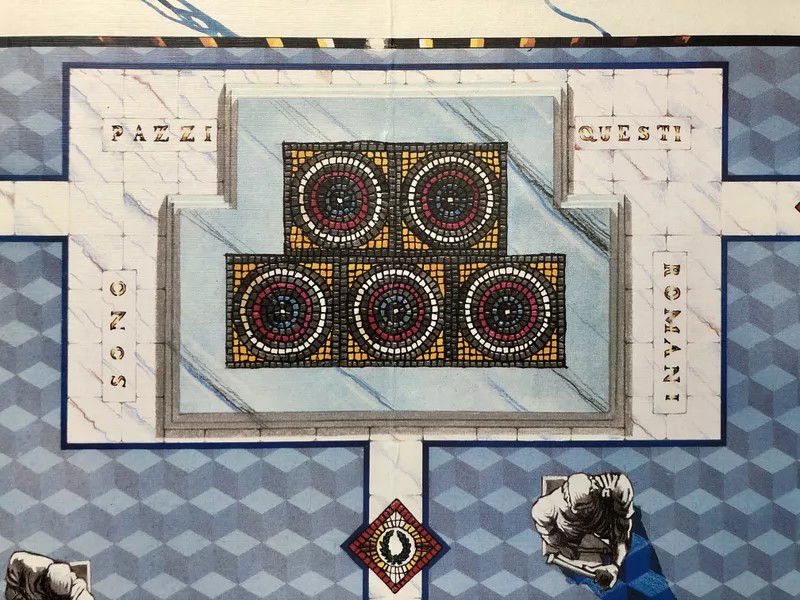
To be honest, when you play Quo Vadis, you actually get the feeling that the roman senators were really crazy - for power, that is. So, let's play!
Quo Vadis - Game Info
Quo Vadis is a 3-to-5 players game, age 12+, by renowned designer Reiner Knizia. Art by Pete Fenlon, Jason Hawkins, Jessica Ney, Franz Vohwinkel and Stephen Graham Walsh.

Quo Vadis was released in 1992 by AMIGO, and has not yet been released in Brazil. Regarding the mechanics, the main ones are: negotiation, space-to-space movement, and voting.
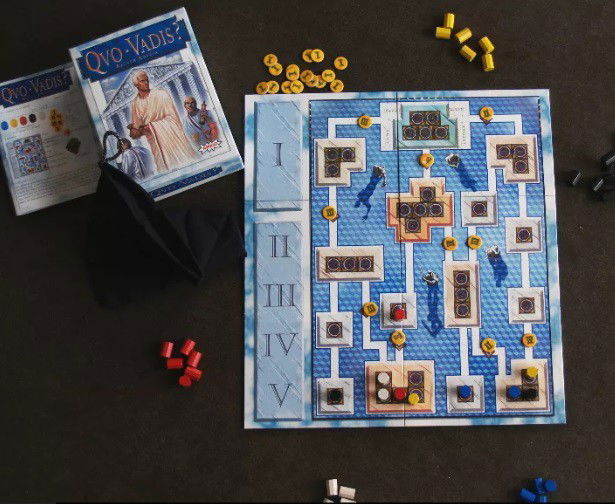
Right on its release year, 1992, Quo Vadis was recommended for the Spiel des Jahres, and on the same year it came in 3rd on the Best Family Game Award on Deutscher Spiele Preis.
The Game
Being a senator in Ancient Rome requires significant negotiating power and numerous agreements, which can often be broken. After all, it's a struggle for power - a spot in the Roman Senate.
You'll need to go through a series of committees, either with your own political clout or with others' support - which, of course, doesn't come for free. Having Caesar's support is crucial at certain times, and remember, only the first five to reach the Senate will have a chance of being elected. Who has the greatest prestige among the five?
This is the scenario of Quo Vadis!
The game's setup is this:
- Place the board in the center;
- Place all laurels with a value of 1 face up in their respective spots on the board;
- Shuffle the remaining laurels face down and place them in their respective spots on the board;
- Draw 10 of these face down laurels, place them on the board in the diamond-shaped spots, then reveal them;
- Place the Caesar token on the diamond immediately below the Senate, covering the laurel there;
- Each player takes 8 Senator tokens of their color;
- Choose who'll be the first player.
The Quo Vadis game board represents a political map of Rome, displaying the many Committees players will have to get through on their way to the Senate. In fact, between the Committees, there are diamond-shaped paths, and on these are Laurel tokens with varying values. The committees consist of:
- 1-member Committees (with only 1 square);
- 3-member Committees (with 3 squares);
- 5-member Committees (5 squares).
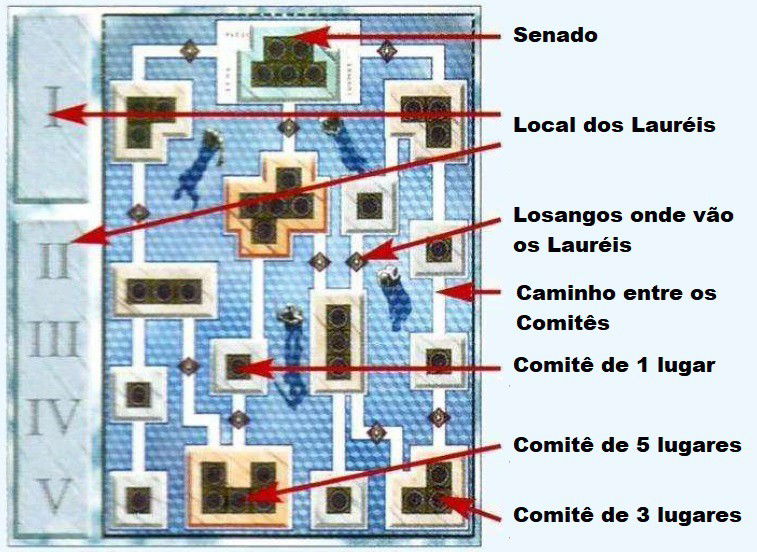
Before we explain each possible action by the players, it's important to note that the Caesar keeps a watchful eye on the entire game, and thus decreed four rules that can never be broken by any Senator:
- Players may only move or place their own Senators;
- Senators may never move backward (in the opposite direction to the Senate);
- Senators may not skip Committees, even if they have no free seats;
- A Senator may use any of the paths leading from the Committee they previously occupied, regardless of their seat on the Committee.

Now that we know the emperor's restrictions, each player will perform one of three possible actions on their turn:
- put a new Senator into play;
- move one of their Senators already in play ;
- move Caesar.
Choosing to put a new Senator into play is a basic action, mostly used at the beginning of the game, after all, we don't have any Senators in any Committee yet. To do this, simply take one of your eight Senators and place it in any of the vacant seats in one of the four Committees lowest on the board.
In the first four Committees, there are two Committees with only one seat, one Committee with three seats, and the last one with five seats. Strategically position your Senator, considering the number of votes you will need to advance to the next Committee.
Speaking of votes, next action is move one of your Senators already in play. This is where the fun begins, with political intrigues running rampant—and that's because, sometimes, you'll need the votes of other Senators. Consider:
- to leave a 1-seat Committee, simply move to the next Committee;
- to leave a 3-seat Committee, you need the support of 1 more Senator;
- to leave a 5-seat Committee, you need the support of 2 more Senators.
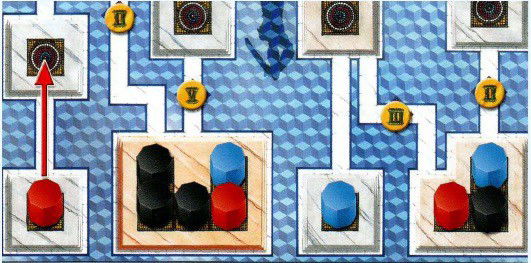
With the exception of the 1-seat Committee, you always need a majority vote, and if you don't have your own Senators to support you, you'll need the help of "fellow" Senators. You'll need a silver tongue, close some deals and make promises—or maybe find a kind soul among the Senators. After all, Senators from other players who vote in your favor earn one laurel from the general supply for their support.
When (and if) you advance to the next Committee, if you have a laurel along the way, simply pick it up and replace it with another one that was unrevealed next to the board.
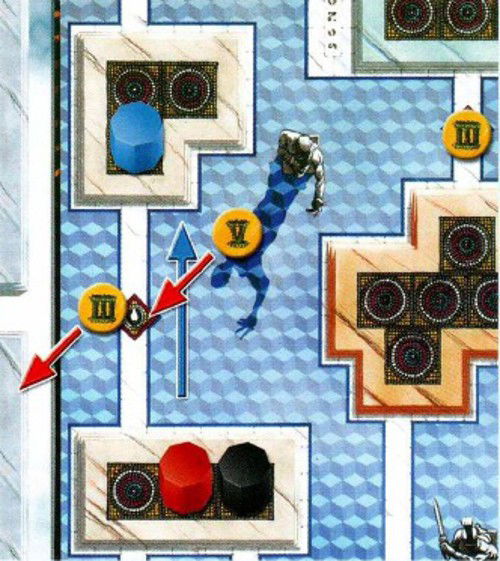
The laurels are located on the diamonds, which in turn are located at the exits of the Committees, always containing 1 laurel that has one of the following values: 2; 2 with the Caesar image; 3; 4; and 5. The 1-value laurel is in a reserved area and is only awarded to a player who supports another Senator in a vote in a Committee.
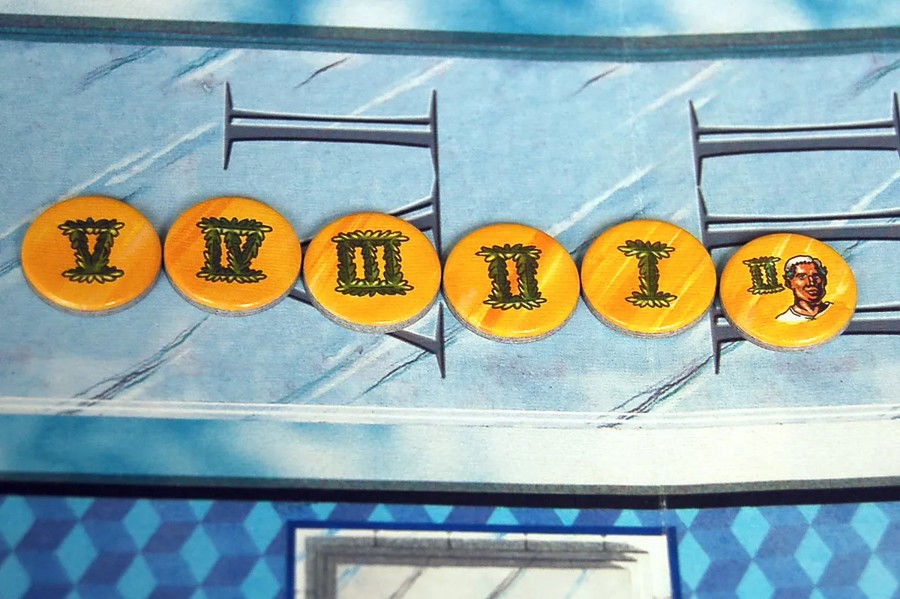
To emphasize, if you can't advance to the next Committee due to lack of support, you can try another Committee that has one of your Senators. If you can't advance in any Committee, you'll have to choose action 1, and put a new Senator into play, or choose the third and final action, which is to move Caesar, that is, move him from one location to another. To do this, pick up his token and place it on top of the desired diamond, covering the current laurel.

Caesar's presence changes the game mechanics, namely:
- It is possible to leave the Committee without support, but without collecting the laurel;
- It is not possible to hold a vote in this Committee.
In short, Caesar's presence gives you an advantage: you can advance to the next Committee, but with some drawbacks. You can even, depending on Caesar's position, reach the Senate itself, but again, without collecting the laurel. There are consequences on your choices.
Once this is done, after performing one of the three possible actions, play continues with the player to the left. This is a turn of Quo Vadis!
Ending the Game
The game ends immediately when the Senate has 5 members.
Among the 5 Senators in the Senate, the player who has received the most laurels wins the game. Obviously, and by exclusion, a player who has no Senators in the Senate can never win the game, regardless of how many laurels they have.
In the event of a tie, among those tied, the player who reached the Senate first wins. Seats in the Senate are filled from left to right, making it easy to determine who reached the Senate first.
Strategy Tips
Quo Vadis is about positioning, agreements, promises, and political support. The game is strategic from the beginning, when you bring a new Senator into play, which isn't that simple. You need to consider all the Committees your Senator can/should join.
If you want a quick advance to the Senate, look for Committees with only one seat. This way, you can, without anyone's support, advance to new Committees, but without earning laurels. Take this into consideration, since in the end, getting to the Senate isn't enough; you also need a laurel majority to win.
I strongly recommend Committees with three seats. They're easier to negotiate, since you only need one more support, which can even come from another of your Senators on the same Committee. But be careful: if this happens, you won't earn the support laurel; this laurel is only awarded to Senators of other players who support you.
If there are no other 1 or 3-seat committees, you'll have to make do on the 5-seats, where two more votes are needed. If you don't have any extra Senators there, things get complicated. You'll have to choose which offers to accept from those who want to help you, and these will then receive one laurel from the stock. Obviously, this is how the negotiations within the Committee begin.
Choices have consequences. To have an offer rejected means you probably won't receive support from that player in the future, or at least they'll demand more for it. This is the heart of the game!
When you move one of your Senators already in play, the game truly shows what it's all about, because it's time to gather political support. The rules guarantee, as already mentioned, one laurel to anyone who supports you - but this laurel comes from the general supply, which is limited. So, at some point, you'll have to negotiate with your own laurels, or with promises of support in another commitee.
Also, the game's rules state clearly that promises don't necessarily have to be kept. That's when the game really gets on another level - politics has a way to make games more fun. Of course, it's nice to help and be helped, but within the game, sometimes returning a favor will be very bad for you. So, since it's allowed - and even encouraged, in a way -, breaking promises is part of the game—let's call it bluffing, to soften the mood.
Some possible promises or agreements could include:
- a future vote in favor of the Senator who supported you;
- a promise to move Caesar in your next action;
- giving extra laurels for their support—yup, a bribe;
- a promise not to support any Senator other than the one who supported you;
- and so on.
Lastly, the action to move Caesar can be mostly used to hinder opponents, preventing them from collecting laurel when advancing to a new committee. I only recommend using Caesar actively when you urgently need to enter the Senate to avoid losing a seat, because not collecting the laurel is truly harmful. Ultimately, I recommend using it to hinder other players, but be aware that this will take up a turn.
Based on these tips, develop your best strategy, position your Senator in the best committees, make good deals, and win in Quo Vadis!
Rules' Videos
In spanish:
In english:
Pedagogical Tips
If you're looking for a game to entertain the kids and sure to bring lots of laughter, Quo Vadis is the game for you. It also offers several interesting stimuli!
The game truly encourages strategy, from deciding where and when to place one of your Senators in play, to when and where to move your Senators, and finally, where to use Caesar's presence. Children will find themselves developing a strategy while playing.
Logical and mathematical reasoning will be needed to choose the best paths, not just based on the value of the laurels, but also to reach the Senate. You'll have to keep track of how many laurels you have to use as a bargaining chip in some cases, which leads us to another important stimulus: decision-making.
This is done by choosing where to go, who to support, who not to support, or even whether to bring Caesar closer to your Committee. These are important decisions that greatly impact the game. You'll certainly see the kids talking and figuring out what decision to make. This is excellent encouragement.
Let the kids decide, act, vote in favor, vote against, laugh at everything, promise support, fulfill it, and sometimes don't. After all, it's a game and the goal is to have fun. Of course, make it clear that breaking promises is only for fun. It's an excellent time to congratulate those who keep their promises and encourage them to consider the real consequences of not keeping them.
Educationally, Quo Vadis encourages strategy, decision-making, logical-mathematical reasoning, and, above all, it's fun!
I recommend Quo Vadis for your collection!!!













— Comentarios 0
, Reacciones 1
Se el primero en comentar